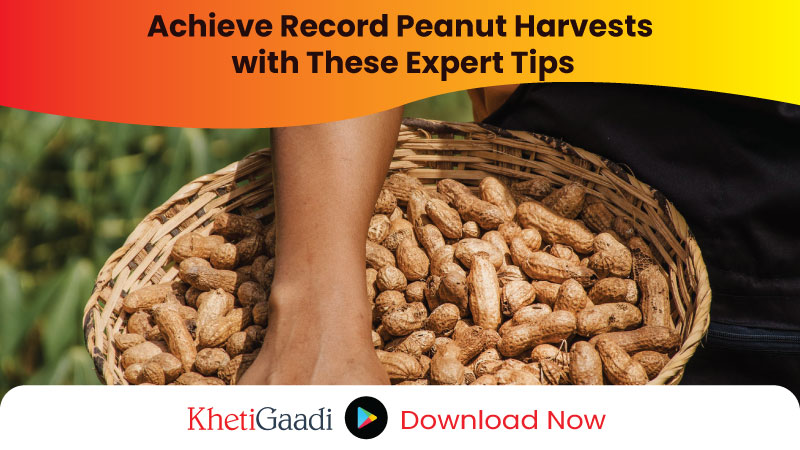India’s peanut exports are expected to rise by 15%
The Indian peanut industry has been witnessing an upward trend in exports, driven by strong demand from countries like China and Indonesia. This year, India’s peanut exports are expected to rise by 15%, supported by higher production and favourable international prices. Additionally, the adoption of improved farming techniques and high-yielding seed varieties has led to a significant increase in productivity. The Indian government continues to promote oilseed crops through various schemes and subsidies, encouraging more farmers to take up peanut cultivation. This combination of factors is likely to result in higher profitability for peanut farmers in the upcoming season.
KhetiGaadi always provides right tractor information
Peanut Cultivation
Peanut is a major oilseed crop grown during the Kharif season, typically sown pre-monsoon from the first to the second week of June. To boost peanut production, it is crucial to protect the crop from pests and diseases. Peanuts are susceptible to harmful insects and diseases such as termites, white grubs, Galkat (collar rot), Tikka (leaf spot), and various viruses. Among these, white grubs and Galkat cause the most damage. Therefore, seed treatment before sowing is essential.
If you wish to know organic methods to increase your overall cultivation yield, please call KhetiGaadi counsellor on 07875114466 or write an email to connect@khetigaadi.com
According to the Rajasthan Agriculture Department, to protect the peanut crop from pests and diseases, treat the seeds as per departmental recommendations. When treating seeds, farmers should wear gloves, face masks, and full protective clothing. Galkat disease causes plants to wilt, and black fungal growth can be seen on the collar part and roots of affected plants. To prevent this disease, soil treatment, seed treatment, and using disease-resistant varieties are recommended.
Seed Treatment
Before sowing, farmers should mix 2.5 kg of Trichoderma with 500 kg of cow dung and spread it over one hectare. Additionally, treat the seeds with 3 grams of Carboxin 37.5% + Thiram 37.5%, 3 grams of Thiram, or 2 grams of Mancozeb per kg of seed. For reduced use of chemical fungicides, treat the seeds with 1.5 grams of Thiram and 10 grams of Trichoderma per kg of seed.
Managing Underground Pests
For integrated management of underground pests in peanut crops, add 250 kg of neem cake per hectare to the soil before sowing. Treat the seeds with 6.5 ml of Imidacloprid 600 FS per kilo of seeds. Additionally, 15 days after sowing, add 0.5 grams of Beauveria bassiana per square meter. In areas with white grub infestations, protect the crop by treating the seeds with 6.5 ml of Imidacloprid 600 FS per kilo, 2 grams of Clothianidin 50 WDG per kilo, 3 ml of Imidacloprid 17.8 SL per kilo, or 25 ml of Quinalphos 25 EC per kilo. Dry the treated seeds in the shade for 2 hours before sowing.
Bacterial Culture Treatment
Treating seeds with Rhizobium culture before sowing can significantly increase crop yield. To do this, prepare a solution by heating 300 grams of jaggery in 2.5 Liters of water. Once the solution cools, add 600 grams of Rhizobium bacterial culture. Mix the seeds to be sown in one hectare with this solution, ensuring an even layer on all the seeds. Afterward, dry the seeds in the shade and use them for sowing promptly. Ensure to treat the seeds with Rhizobium bacterial culture only after treating them with fungicides and insecticides.
Stay tuned with us on our whatsapp channel for more real time updates on various agriculture related schemes and innovative cultivation methods aimed at supporting our hardworking farmers. For more detailed information, visit https://khetigaadi.com/ regularly!
To know more about tractor price contact to our executive






